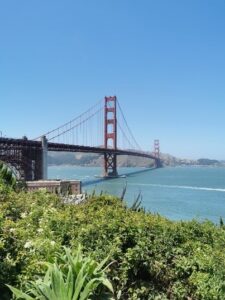Kategorie: ‘Host Country’
My research stay at the University of Wisconsin-Milwaukee
- PhD Candidate for Economics
- USA, Milwaukee
- University of Wisconsin-Milwaukee
- 08/2025 – 01/2026
Preparation and organization of the stay
The preparation of the research stay was smooth and well organized. Together with my doctoral supervisor at RWTH Aachen University, I contacted a distinguished professor at the University of Wisconsin-Milwaukee via email. I was familiar with his work from numerous academic publications, including several joint papers with German scholars. He responded very positively and was highly supportive, which made arranging the research visit straightforward.
Following his invitation, I applied for and obtained a J-1 visa. The language requirement for the visa process was limited to providing proof of at least a B2 level in English. Health insurance was a required component of the stay; I chose ISO Health Insurance to meet this requirement. Throughout the preparation process, the Center for International Education at the host university, as well as the secretariat of the Economics Department, provided valuable guidance and administrative support.
Accommodation was arranged through the host university’s housing services, and I was able to stay as an external guest in a one-bedroom apartment in one of the university residence halls. I booked the flights several months in advance, from Frankfurt to Milwaukee.
Shortly before departure, I finalized additional arrangements, such as organizing a mobile phone plan, obtaining a suitable power adapter, obtaining US Dollars and ensuring access to a credit card. Overall, the administrative and logistical preparation for the research stay was efficient and well supported.
First steps after arrival in host country
I arrived in the host country at the end of July, taking advantage of the possibility to enter up to 30 days before the official start of the research stay. This allowed me to adjust to the time difference and become familiar with the city.

Statue on Milwaukee River Walk
©International Office
During the first days, I stayed in an Airbnb apartment before moving into Kenilworth Square, one of the university residence halls. The accommodation there was of very high quality. I lived on the seventh (top) floor and had a view of Lake Michigan. The apartment was quiet, well equipped and provided all essential household items, including kitchen utensils. In addition, a 24/7 service desk was available.
Shortly after arrival, I explored the university campus and discovered that a free shuttle bus operates between Kenilworth Square and the main campus. I was able to use this service after obtaining a student card at the Student Union. I also completed the required registration at the Center for International Education.
Before officially starting my research stay on August 1, I had the opportunity to meet my supervising professor for a meal, which provided a welcoming and informal introduction to the host institution and helped establish a productive working relationship from the outset.
Academic/professional experience
I was not formally enrolled as an employee or PhD student at the host university and therefore did not have to pay any tuition or enrollment fees. The Economics Department consisted of approximately 15 professors and 15 PhD students. Interestingly, there were also three other permanent German PhD students present through an exchange program with the University of Giessen.
I was provided with my own office. I was allowed to attend the economics courses, including both classes taught by fellow PhD students and PhD-level courses led by faculty professors. In particular, I found the quality of the PhD courses to be very high. The courses emphasized interactive teaching methods, including quizzes, incentives for active class participation (e.g., bonus assignments) and innovative exam formats.
During my stay, I worked closely with my supervising professor on two research papers in the area of performance pay. We met regularly to discuss progress, which made the collaboration highly productive. I also had frequent and productive exchanges with other PhD students about our research. Overall, the department fostered a very supportive and collegial research environment and I experienced a strong sense of cooperation and mutual assistance among faculty and doctoral researchers.
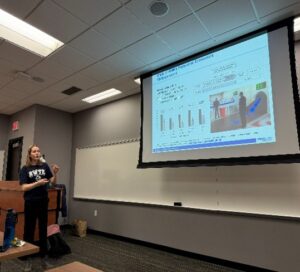
Me during my EconClub Presentation
©International Office
The department also offered a vibrant academic seminar culture. Weekly Wednesday “labor lunch talks” allowed PhD students to present their research; I presented one of my RWTH research projects in this forum. In addition, a Friday seminar series regularly invited external researchers to present their work. Beyond academic seminars, the university hosted numerous professional and career-oriented events. For example, a representative from the Milwaukee Bucks’ data analytics department gave an insightful talk about applied data work in professional sports.
During my stay, an Economics Club was founded, and I participated in its biweekly meetings. Toward the end of my visit, I gave a presentation about RWTH Aachen University and my research group in this Economics Club, comparing academic structures and research environments between RWTH and UWM.
On a personal level, I found the academic community to be exceptionally welcoming. I developed close friendships with fellow PhD students and we frequently engaged in both academic and social activities together. The widely held view that people in the US Midwest are particularly friendly was strongly reflected in my experience.
Financing
The overall costs associated with the research stay were manageable but higher than typical living expenses in Germany. Expenses related to the visa application, health insurance and administrative requirements amounted to approximately USD 500. Round-trip flight tickets cost around USD 800.
Transportation costs were relatively low due to the availability of a free university shuttle and complimentary UWM taxi services after 6 p.m. As a result, I only occasionally purchased public bus tickets to travel to downtown Milwaukee, which cost USD 2.75 per trip.
Housing represented the largest expense. I paid USD 2,100 per month (including utilities) for my apartment at Kenilworth Square. This rate was relatively high because I stayed as an external guest; official PhD students typically pay around USD 700 per month for comparable university housing. In addition, longer-term rental options in the private market, especially unfurnished one-bedroom apartments, are available at significantly lower prices (approximately starting from USD 1,000 per month including utilities).
In general, the cost of living in the US is higher than in Germany, although Milwaukee is considered a comparatively affordable city within the US. Food expenses were noticeably higher than at home. I frequently shopped at Whole Foods, with Pick ‘n Save serving as a somewhat more affordable alternative nearby. Grocery shopping often amounted to around USD 50 for a small number of items. However, the university provided a food pantry, where students could obtain free groceries up to three times per month. Eating out can be relatively inexpensive when using fast-food options. I spent several hundred dollars per month on leisure activities, although many free or low-cost recreational opportunities were available in the city and on campus.
To support my stay, I received € 3,000 through the RWTH Research Ambassador Program.
Leisure
Milwaukee offers a wide range of leisure and cultural opportunities. Before my stay, I had not fully realized how much the city has to offer, but I found it to be a vibrant and, in my view, underrated destination. The city features several sandy beaches along Lake Michigan, beautiful parks and notable cultural attractions such as the Harley-Davidson Museum and the Milwaukee Art Museum. I particularly enjoyed exploring local cafés, cinemas, the Milwaukee Public Market and various farmers’ markets and festivals such as the German Fest or the Summer Music Fest.
Sports and live entertainment are also a major part of the city’s culture. The Milwaukee Bucks play at the Fiserv Forum, which regularly hosts both NBA games and concerts. The city is also home to the Milwaukee Brewers, who reached the semifinals of the MLB during my stay. One of my more unique experiences was visiting a shooting range with a fellow PhD student and watching an IndyCar race. Joe Cat’s is a popular bar on Brady Street, one of Milwaukee’s main nightlife areas. Water Street also offers many lively venues for going out. The university provided many free recreational opportunities, including billiards, bowling, gaming facilities and a fully equipped fitness center with a gym, basketball court, swimming pool, racquetball courts and group exercise rooms. Wisconsin itself has strong German cultural influences and is well known for its breweries, beer culture, cheese curds and frozen custard.

Me in Lambeau Field, Green Bay
©International Office
Milwaukee’s location makes it convenient for regional travel. Chicago in Illinois is less than two hours away by train, and I visited several times to experience its architecture and the river walk. I also traveled with a fellow PhD student to Madison, the capital of Wisconsin, where we explored the University of Wisconsin-Madison campus, its impressive sports facilities and the State Capitol building. Additionally, I took a train trip to Minneapolis, Minnesota to explore the city. Toward the end of my stay, I traveled with another PhD student to Green Bay to visit the Packers stadium, and then to Door County, known for its scenic parks and charming small towns.
The climate in Milwaukee is quite extreme. Winters are very cold and snowy, with temperatures dropping to around -25°C on several days, making it very suitable for winter sports. In contrast, summers are warmer than in Germany, and the city feels especially vibrant after the long winter months.
I also traveled with my boyfriend to the Rocky Mountains and the East Coast during a two-week summer vacation, and spent Christmas and New Year’s Eve with my great-aunt’s family in Seattle. Flights within the US are usually inexpensive and there is so much to see, so I highly recommend traveling.
What added value did the stay have for my studies/career prospects?
The research stay significantly strengthened my academic profile by expanding my international research experience, deepening my expertise in labor economics and leading to productive research collaborations, including joint papers. It also broadened my professional network and improved my ability to work in an international research environment, which will be highly beneficial for my future career.
Beyond my personal career development, the stay contributes to society by fostering international knowledge exchange and strengthening research ties between German and US institutions. By sharing my experiences and research results with colleagues and students at RWTH and UWM, I help transfer knowledge and encourage future international academic cooperation.
To what extent does my stay abroad have a sustainable character?
The stay has a strong sustainable impact, as it led to long-term academic collaborations and personal connections that will continue beyond the visit. I plan to maintain close research ties with my supervising professor and to pursue further joint projects with PhD students at the host institution. In addition, the friendships I built and the continued exchange with colleagues foster lasting international networks. These ongoing collaborations support sustained knowledge transfer and contribute to long-term cooperation between RWTH and UWM.
Conclusion
Overall, my research stay was an extremely rewarding experience. I learned a great deal, both academically and personally, and had the opportunity to meet many inspiring and talented people. Living in Milwaukee was very enjoyable. I am confident that I will return in the future and continue meeting with the people I connected with during my stay. I would like to sincerely thank my supervisor and his wife for their support and hospitality throughout my stay.
My Research Stay at Stanford University
- PhD Candidate for Product Engineering of E-Mobility Components
- USA, Stanford
- Stanford University
- 06/2025 – 11/2025
Preparation and organization of the stay
I am currently a fourth-year PhD candidate at the PEM at RWTH Aachen University. From early on in my academic career, it was a clear personal and professional goal to spend part of my doctoral studies abroad. During my Master’s degree, this plan could not be realized due to the COVID-19 pandemic, which made international research stays largely impossible at the time.

©International Office
As a result, I continuously sought opportunities later on and remained in close exchange with professors and group leaders from relevant research groups in the United States. These discussions helped me sharpen my research interests and identify potential host institutions. Ultimately, a combination of persistence and good fortune led to an exciting opportunity at Stanford University, where I was offered a visiting research stay within the STEER research group.
Following the initial contact, the process moved forward very quickly, and I received an official invitation from Stanford. A particularly positive aspect was the excellent administrative support on the host side: a dedicated contact person at the department guided me through all formalities, including visa-related questions and institutional requirements. This support significantly reduced the bureaucratic burden and made the overall process smooth and manageable.
In parallel, I applied early for on-campus housing through Stanford’s internal housing lottery system. Although I was not allocated permanent housing through this route, I was able to secure two consecutive sublets directly on campus. This required some flexibility and a bit of luck, but it was strongly facilitated by an active and supportive German community at Stanford. In this context, I can highly recommend joining relevant community groups or chat channels, as they are extremely helpful for housing, administrative questions, and general orientation.
Regarding financing, a small portion of the travel and stay expenses could be covered through my research project, with explicit support from the project sponsor. Institutionally, the entire stay was handled as an extended business trip, which simplified internal approval processes and reimbursement procedures.
Overall, the preparation phase required initiative and coordination but was greatly eased by strong institutional support on both sides, proactive networking, and early planning – especially with respect to housing and administrative requirements.
First steps after arrival in host country
My stay effectively started immediately after arrival. I was able to move directly into my sublet room, which was located on campus at Stanford University. This proved to be extremely convenient, as it allowed for very short walking distances to all relevant facilities, including offices, laboratories, and shared infrastructure.
Since I was not enrolled as a regular student, I did not have to select or attend any courses. Instead, I was able to start my research activities in the host research group right away, without any delay. Administrative formalities, such as obtaining a student or visiting researcher ID card and access credentials, were handled very efficiently and could be completed within a single day.
One practical recommendation that cannot be overstated is to obtain a bicycle as early as possible. University campuses in the United States are typically very large and spatially cohesive. Compared to Aachen, distances are significantly longer, and daily mobility without a bike is impractical. A bicycle quickly became an essential part of everyday life and greatly improved flexibility and efficiency on campus.
Academic experience
I was officially registered as a Visiting Student Researcher at Stanford University. In this status, I was neither required nor formally allowed to enroll in regular courses for credit. However, in coordination with the respective principal investigators, it was possible to sit in on lectures and attend courses informally. I would strongly recommend making use of this opportunity, even if it is not mandatory.
The teaching quality at a university like Stanford is exceptionally high. Courses are very well structured, clearly motivated, and highly engaging. Beyond their academic value, some lectures are also extremely beneficial from a personal and professional development perspective. A particularly striking example was the course “Personal Finance for Engineers”. The way financial literacy, personal finance, and investment strategies are taught to engineering students is exemplary and forward-looking. This is an area that, in my view, should receive significantly more emphasis in engineering education in Germany as well.
In terms of social and academic integration, the German community at Stanford plays an important role. It is the second-largest international community on campus, which made integration very easy. I was warmly welcomed and quickly connected with like-minded people, both academically and socially. This network not only facilitated everyday life but also enabled valuable exchanges on research, career paths, and life in the US more broadly.
Overall, despite not being formally enrolled in courses, the academic exposure, high-quality teaching environment, and strong community integration resulted in a highly enriching professional and personal experience.
Financing
The research stay was financed primarily through private means, supplemented by funding from my ongoing research project and the support of the RWTH Ambassador Scholarship. This combination made it possible to cover the essential costs associated with the stay, including travel, insurance, and part of the living expenses.
It comes as no surprise that private universities in the United States – and especially in the Bay Area – are associated with very high costs. As a visiting researcher, I was required to pay a monthly university fee. In addition, general living expenses, particularly for food and daily necessities, are significantly higher than in Germany. Housing costs also represent a substantial share of the overall budget, even when living in shared or sublet accommodations.
Nevertheless, the stay is absolutely manageable from a financial perspective with appropriate planning and funding support. More importantly, it should be viewed as a strategic investment in one’s own education and professional development. The return on this investment – through academic exposure, international experience, networking, and personal growth – is exceptionally high and, in my assessment, clearly justifies the associated costs.
Leisure

©International Office
California is, quite simply, breathtaking. This is often said – but experiencing it firsthand truly confirms it. The diversity of landscapes along the US West Coast is remarkable, ranging from dramatic coastlines and deserts to mountains and forests. Combined with the consistently pleasant climate throughout most of the year, California offers exceptional conditions for outdoor and leisure activities.
One absolute highlight – and a clear recommendation for anyone spending time in the region – is visiting the national parks. They are unique on a global scale and offer experiences that are difficult to compare with anything in Europe. In particular, trips to Yosemite National Park, Sequoia National Park, Kings Canyon National Park, Death Valley National Park, Joshua Tree National Park, and the Grand Canyon are strongly recommended. Each of these parks is distinctive in its own way – whether through scale, geology, climate, or biodiversity – and all are truly unforgettable.
What added value did the stay have for my career prospects?
For me personally, the stay was particularly valuable due to the different working culture and the strong attention to detail within the host research group at Stanford University. The way research questions were approached – often with a high level of precision, openness, and constructive discussion – was both refreshing and intellectually stimulating.
The people I worked with were, without exception, highly interesting personalities with very diverse and inspiring backgrounds. This diversity of perspectives significantly enriched daily research interactions and broadened my own way of thinking. Beyond the immediate academic collaboration, one of the most lasting outcomes of the stay is the international network that emerged and continues to exist beyond the exchange itself.
At the same time, the exchange was not a one-way transfer. Through my own research background and prior project experience, I was able to contribute concrete technical expertise and practical insights to the group on site. This mutual exchange of knowledge and perspectives was a key strength of the stay.
On a broader level, California and Germany share more similarities than is often assumed, particularly with regard to innovation-driven industries and technology ecosystems. This is especially true in my field of work, the battery industry, where comparable ambitions exist in terms of sustainability, industrial scaling, and technological leadership. Many of the approaches, mindsets, and organizational structures observed in California offer valuable learnings that should be examined more closely and, where appropriate, adapted for application in Germany.
Especially in the current politically turbulent times, it is becoming increasingly important to identify partners with shared values and to strengthen cooperation with regions such as California. Building closer ties in strategically relevant technology fields can help enhance resilience, innovation capacity, and long-term competitiveness – benefiting both individual researchers and society as a whole.
To what extent does my stay abroad have a sustainable character?
The stay abroad has a clearly sustainable character, as the exchange of experience and knowledge extends well beyond the physical duration of the visit. The professional and personal connections established during the stay continue to enable ongoing scientific dialogue, informal consultation, and mutual learning over time.
Conclusion
I can wholeheartedly recommend such an exchange stay to anyone considering it. Despite the organizational and financial challenges involved, the personal and professional benefits clearly outweigh the costs. One should not be discouraged by the financial effort required – when viewed in the context of long-term career development, the investment is more than justified.
My Internship at Bosch Cooperation in Tranås
- Chemical Engineering M.Sc.
- Sweden, Tranås
- Bosch Cooperation
- 03/2024 – 08/2024
Application & Finding an Internship
A fellow student told me about her internship at a company in Tranås, Sweden. There, the company develops and researches all kinds of heat pumps, utilizing power from the mountain, the water, or the air. On the company website, I found several open positions in different departments starting in spring 2024. I applied for a few positions and quickly received their answers. After 2 interviews, I got the internship position in the engineering department, which is working on the reliability of the components in the refrigerant circuit of the heat pump.
Accomodation & Living Expenses
The company is located in Tranås, a small city in the prince Småland in Sweden. I was accommodated with other international interns and thesis students in a hotel directly next to the lake Sommen. Every intern had their own private room and bathroom.The living room, kitchen, Office and laundry room was shared with the other interns. There was also a gym and sauna in the hotel, which we were allowed to use. It took about 10 minutes to drive from the hotel to the city center of Tranås and about 15 minutes to the company. We were provided with 2 cars and 1 van for us interns to drive to work, grocery shopping and other activities. It was also possible to rent company bikes, which was especially nice in the summer.
The provision of accommodation and cars simplified the preparation for the internship a lot, because I didn’t had to look for apartments abroad. Living with 13 other international interns and students, it was easy to settle in and find friends. I really enjoyed living with so many people from different countries and cultures. We often cooked dinner together and spent the evenings on the terrace enjoying the sunset over the lake together.
Everyday Life & The Internship
For my internship contract I had to work 40 hours per week, usually from 7:30 am in the morning until 4:30 pm in the afternoon with a 1-hour lunchbreak. The interns were allowed to work flexible hours and arrange their working hours themselves. During my time at the company, I worked with my supervisor on 3 big, different topics. I was able to get deep into the different topics, apply my knowledge from university and get some work experience.
The working culture in Sweden is non-hierarchical. Everyone is approached just with their first name, regardless of their title, age or status in the company. This is also reflected in the casual dress code at the office. Managers and workers are both working in comfortable and convenient clothing like jeans and sweatshirts. It is also worth mentioning that the Swedes have a very high sense of duty and connection towards their work, their team and the company. Therefore, they are often proudly wearing clothing with the company logo. Important decisions are not only made by senior managers or executives, but everyone on their team is also included in the decision and asked on their opinion on the subject matter. As an intern I felt as part of the team since my first day at work and my opinion was valued and not less worth than from other colleagues. The Swedish way of working is characterized by trust, independence and flexibility of the employes. You are able to organize your workday as you prefer, whether you want to work from your desk, a meeting room or from home.
A very important part of the Swedish work culture is the Swedish coffee break called “Fika”. At least once per day you get yourself a coffee, tea or hot chocolate and sit down with your colleagues on the couch and talk about non work-related topics. Usually someone brings some baked goods with them to share and enjoy during Fika. There is a huge variety of different swedish pastries, like the famous Kanelbullar, Wienerbröd, Chokladbollar and Blabärspaj. I was not surprised, when learned that Sweden is one of the countries that consumes the most amount of coffee per person.
People in Sweden value their work life balance a lot. During lunch time I could go to free Yoga classes, go for a quick session at the companys gym or join one of the running groups.
My colleagues at work were from a lot of different countries, so I talked Englisch most of the time during my internship. Since I shared my accommodation with other interns from all over Europe, I was able to learn some phrases in French, Italian, Swedish and Portuguese.
Free time & Tips
Summer is the best season to for a visit in Sweden, since the amazing Swedish nature with all the beautiful lakes and woods is coming alive. In Sweden, there is the so called “Allemansrätt”, which guarantees you free access to all parts of nature. You are allowed to visit ever dock on the lake, collect as much berries or mushrooms as you want and put up your tent on every island or wood as long as you don’t bother the owner. Everywhere in Sweden you can find amazing hiking trails through fairytale woods with shelters and fireplaces for camping. Even though the summers in Sweden are not as warm, you can easily go swimming in one of the many beautiful and peaceful swimming lakes.
On the weekends I often visited one of the citys around Tranås. I really enjoyed my trip to the small town Gränna, where the sugar cane was invented and stroll past all the candy shops with all the colorful candys displayed. I spend a few sunny afternoons sitting in small cafes in Eksjö surrounded by old pastel colored timber houses. But also, bigger citys like Linköping with the medieval cathedral and Jönköping at the lake Vättern are definitely worth a visit.
From Tranås, you can travel to Stockoholm in 3-4 hours by using the train. I had a lot of fun walking around the old part of the town “Gamla Stan”, visiting the famous Vasa Museum and going for a night out in big city like Stockholm.
Gothenburg is known for its archipelago, several scattered islands on the west coast of Sweden. I had a marvelous time while driving with ferries from island to island. On one of the islands, we rented a kajak and paddled along the coastline for a few hours, of course with a few stops for Fika and a swim in the sea. In the evenings, we visited different bars and listened to swedish metal and rock music.
One of my highlight during my time in Sweden was my canoe trip on the lake Ansen. We rented a canoe for a few days at one of the several canoe rentals. We drove through the national park, enjoyed the beautiful nature and stopped on one of the many islands to build up the tent and sleep for the night. I can highly recommend renting a canoe or kajak and going onto the lake, even just for a few hours.
Another one of my highlights was our trip to the island Öland during Midsommar, the national holiday at the summer solstice. At Midsommar everyone is celebrating all day wearing flower crowns in their hair and dancing around a tree, decorated with flowers and leaves. Since it’s the longest day in the whole and it’s not getting dark, you stay up late and party all night.
Conclusion
I spent a fantastic and wonderful summer during my internship in Sweden, experiencing the incredible nature and landscapes. All the Swedes I met were open-minded, super friendly and made me feel very welcome. The work ethic and culture is much more relaxed than in Germany and you meet your colleagues at eye level, regardless of their hierarchical level and enjoy a coffee and cake during Fika. I am thankful for all the beautiful experiences, memories and new friends I made during my time in Sweden.
My Internship at the University College Dublin
- Molecular and Applied Biotechnology M.Sc.
- Irland, Dublin
- University College Dublin
- 04/2024 – 06/2024
Finding and Applying to an Internship
Before my stay abroad, I wasn’t sure where I wanted to go or what I wanted to do. However, when my girlfriend told me she was offered an internship position at a school in Dublin, my decision became clear. We decided that experiencing our internships abroad in the same city would make things easier, so I started searching for research groups in Dublin that interested me. I explored the websites of known universities, searching for researchers focused on bioprocessing, bioeconomy, and microbiology. I was particularly drawn to one research group, which aimed to utilize microalgae for the valorization of food waste. I directly applied for a three-month research internship, and after a few weeks and two Zoom calls, I was told that I could do the internship.
Accomodation and Living Expenses
Securing an affordable place to stay in Dublin was challenging. The city has a housing crisis, making flats very expensive. Student accommodations on the UCD campus were not a cheaper option, with the lowest price being 800 Euros per month for a shared room, and their application timeframes didn’t fit my schedule. Fortunately, I found a room in a shared apartment for 850 Euros per month on the website “Homestay”. At the start I was feeling very unaccustomed to living with a stranger but that feeling faded away with time when I got to know my flatmate better. The commute to the university was about 30 minutes, and a trip to the city centre took an hour. Despite living outside the city, I enjoyed the greenery, particularly Fernhill Park, which became one of my favorite spots in Dublin.
I usually did my grocery shopping after work once a week, as the smaller stores near my apartment were quite expensive. For example, cheese could cost up to 5 Euros per pack. Bulk shopping at a discount market was essential for affordable food, except for bread, which was inexpensive everywhere but of course not comparable to German bread 😉. I definitely recommend to only shop in large discounter markets in Ireland.
Everyday Live
I felt a bit nervous on my first day, but that quickly faded as I got to know the welcoming members of my research group. The lab environment and research methods were similar to those I was familiar with in Germany, which helped me settle in. Although the general approach was familiar, I still learned new laboratory techniques and tricks from my supervisor, especially regarding sterile work.
My tasks were divided between data analysis of existing literature and practical laboratory work with microalgae, known as wet-, reproducible outcomes. While there are standard practices, each lab has its own tricks lab or bench work. Working with microorganisms requires strict sterile conditions to prevent contamination and ensure predictable to maintain sterility, and I was grateful to learn new methods that were unfamiliar to me from my previous experience in German labs.
One aspect I appreciated about my work was the independence I had in deciding when and how to approach my tasks. Academics often start work later than usual, and this seemed even more common in Ireland. I typically worked from 9:30 am to 5 pm, but some colleagues started later and stayed longer.
In the evenings, I didn’t do much besides going for walks and cooking dinner, with leftovers serving as lunch the next day. Without a bike and with limited bus service in my area, my options for activities were slim. However, I eagerly looked forward to the weekends when I could explore more of Dublin and Ireland.
Free Time and Tips
Although my work group was friendly, social interactions outside work were limited to a monthly movie night. Luckily, I was part of a group of interns from the school where my girlfriend worked. Together, we made the most of our weekends by exploring Dublin’s pubs, restaurants, hiking trails, sightseeing spots, and local markets and art scenes.
Ireland’s pub culture is something special. On weekends, it’s common to go out, have a few pints, and dine at restaurants. Everyone is relaxed and enjoying the weekend atmosphere. Most pubs have live music, and the crowd cheers and sings along, creating a sense of unity and merriment that I have yet to experience in Germany. I personally loved the more traditional “Porterhouse” in the temple bar quarter but also the modern “bonobos” where tabletop games were played and who had a wide variety of all sorts of drinks. Dublin’s culinary scene is also diverse. I enjoyed Indian, Thai, Vietnamese, Spanish, and occasionally Irish food.
Apart from the bustling city, I loved Ireland’s nature the most. Green hills and meadows are everywhere, often contrasted by steep cliffs overlooking the sea. I often visited the peninsula of Howth, close to Dublin, taking all my visitors there because it is a must see for everyone visiting Dublin. It is a 50-minute bus ride from Dublin city center, but only 30 minutes from my girlfriend’s place, where I stayed most weekends. Two highlights at the end of my stay were trips to Galway and Belfast, where I experienced other cities in (Northern) Ireland and took a bus tour along the coast, where I could again awe the nature and the rougher northern coast line. When traveling Ireland, I would recommend taking the train if possible. Train tickets between the big cities cost only 8 Euros and the trains are very clean and spacious making the ride very pleasant. The best thing is: while driving you can view the beautiful landscape.
Conclusion
All in all I can say my internship in Dublin was a remarkable experience, both professionally and personally. I gained research skills, made new friends and could experience the culture of Ireland first hand for 3 month. Especially living and working in a foreign country is an experience that is hard to come by easer than with an Erasmus internship. I am happy I could have that experience and I am sure I will never forget it.
My Internship at the Manuscriptorium in Czechia
- Philosophy, Literary and Linguistic Studies B.A.
- Czechia, Prague
- Manuscriptorium Digital Library of Written Cultural Heritage
- 06/2025-07/2025
Application
I heard about the internship opportunity at the Manuscriptorium (part of the National Library in Prague) from an online article I read. I applied online and after a short period of time they agreed to let me do the internship in Prague. I applied for the Erasmus internship support with the help of RWTH. After filling out the forms I received the confirmation shortly after. The whole process was easy and straightforward.
Accommodation
Finding accommodation in Prague is very difficult and the prices have risen over the years. The locals in Prague told me that finding a flat is even difficult for them. I got a small furnished room in a shared flat with five other people who were also mostly international students. My room was close to the city centre, and I paid 15900 Kč (~640€). For other students I recommend getting a room further away from the centre and looking through Facebook. The public transport in Prague is cheap and amazing, especially the trams and the metro. I paid around 20€ a month and could use every tram, metro, bus and train inside the centre and the surrounding area.
Everyday life in Prague and tips for other students
I really enjoyed living in Prague as it is a very beautiful and big city so there is always something to do. I tried learning some Czech, but it is very difficult and since I only spend two months in Prague and the language at my internship was English, I only learned a few words and sentences.
During the first weeks I often visited the famous tourists’ spots like the Prague castle or the Charles bridge. There are also a lot of beautiful churches that I visited, however in Prague you often must pay to go inside them. Since the city is so beautiful and has a lot of amazing architecture, I also often just walked through the city looking at the buildings. I also met some Czech students that I went climbing with or went to the cinema or the bar. I also visited a lot of exhibitions. In my time in Prague, I went to the Mucha and the Kafka Museum and saw a David Lynch exhibition as well as one focusing on women artists throughout the ages. Surrounding Prague is also a lot of nice nature. I went to Divoká Šárka, which is a nature reserve with a big lake that was perfect for swimming. There is a website called goout.net that I would recommend to all students going to Czechia, it shows concerts, museums, parties and many other events happening in Czechia, but it is also available for Slovakia and Poland.
I also went to some tea rooms that are very cozy and nice if you enjoy freshly brewed tea. In Prague there were also many bistros. Many of these are affordable (the price is calculated based on the weight of your meal) and offer vegan/vegetarian food. Because I am vegetarian I ate at these places a lot. Since Czech food is often made with meat, I could not try a lot of it but there is a meal called Smažený sýr which is fried cheese and fries and tastes nice. Many places also sell homemade lemonades that I can highly recommend, the one I liked the most is Malinovka, which is raspberry flavoured.
Work
I really enjoyed working at the National Library which is inside a beautiful building near the Charles bridge. It was my job to help catalogue medieval manuscripts with XML according to the TEI guidelines and prepare the files for publishing. For this I was first given a good introduction into XML and the cataloguing of medieval manuscripts. I would then start by doing a rough draft for each manuscript and then refining the files multiple times, adding more information about the manuscript and fixing mistakes. The people working at the library were very nice and helpful.
As well as the cataloguing I helped by popularizing the manuscripts by writing articles about them. I really liked the internship since I got to learn XML as well as the TEI-Guidelines which are often used in digital humanities projects. I also enjoyed that I got to learn about medieval manuscripts in the process, since I am very interested in history.
Conclusion
I really enjoyed my time in Prague and met a lot of amazing people. I was a bit nervous at first about going away, however it was a good time, and I would like to experience something like this again. The city is beautiful, and I appreciate that I got to do the internship and learn new skills.
My Internship in Cork, Ireland
- Electrical Engineering and Information Technology M.Sc.
- Ireland, Cork
- QT Technologies Ireland Limited
- 03/2025-07/2025
As a master’s student in Electrical Engineering at RWTH Aachen University, I had the opportunity to complete a six-month internship at Qualcomm in Cork, Ireland, supported by the Erasmus+ Internship Programme. My goal was to gain practical experience in my field while improving my language skills and experiencing life abroad.
1. Application/Finding an internship
I did not specifically look for an internship in Ireland at the beginning. My main aim was to complete an internship during my master’s studies in a country where English or Spanish is spoken, so I could improve one of these languages. Going abroad was a priority for me. I had heard great things about Ireland from two friends who had previously lived and worked there for half a year, so Ireland quickly became a strong option.
I applied directly via the Qualcomm careers website for an internship position in their Cork office. After completing several interviews, I was fortunate to be offered a place.
2. Accommodation & Living expenses
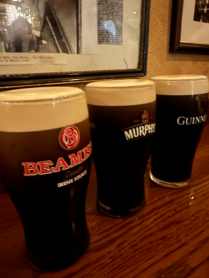
Different Irish stouts: Beamish and Murphy’s from Cork, and Guinness from Dublin.
©Niklas Groß
Shortly after receiving my internship offer, I began searching for accommodation. I was surprised to find that rental prices in Cork were quite high, especially considering the condition and furnishing standards of many of the available options. Fortunately, I was later informed that the company provides shared housing specifically for interns. I was able to rent a furnished 12 sqm room with a private bathroom in a four-person shared house located very close to the city centre. The house included a shared living room, guest toilet, and communal kitchen. The rent was €1000 per month – a flat rate that, as I understood, applied to all interns living in company-provided housing.
Grocery prices were similar to those in Germany. However, prices for personal care products were significantly higher, and alcoholic beverages in supermarkets were extremely expensive. Prices in pubs for a pint of beer ranged between €4.40 and €6.70 – quite steep, though not unheard of compared to places like Cologne. Eating out at restaurants was only slightly more expensive than in Germany.
For baked goods, Lidl offered a self-service bakery section very similar to the ones in Germany, with comparable prices. If you’re looking for high-quality bread, the English Market in Cork is a good place to go – though the prices there are significantly higher.
3. Everyday life/The internship
During my internship, I worked 37.5 hours per week as a Timing Engineer at the company. The office had a very international environment, with interns and colleagues from all over the world. This made for a dynamic and collaborative workplace, where English was the primary working language.
Although I’m unable to go into detail about my specific responsibilities due to confidentiality agreements, I can say that the experience significantly strengthened my technical and analytical skills. I also had the opportunity to work with state-of-the-art tools and contribute to real-world projects within a professional R&D environment.
Regular meetings with my supervisor ensured that I received consistent guidance and feedback, and I always felt well supported by my team. In addition, Qualcomm offered internal learning opportunities such as tech talks and knowledge-sharing sessions, which broadened my perspective on current trends and technologies in the industry.
The office was located within walking distance of the city centre, which made commuting very convenient. I had heard from many others that buses could be unreliable, but since I didn’t rely on them, I can’t confirm this personally.
4. Free time/Tips
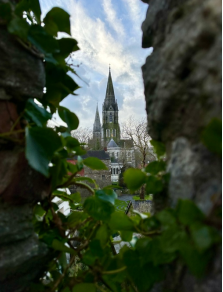
Elizabeth Fort, Saint Fin Barre’s Cathedral, Cork.
©Niklas Groß
Cork is a relatively small city, so you can explore most of the main sights in just a few days. Highlights within the city include Elizabeth Fort, Saint Fin Barre’s Cathedral, the University College Cork (UCC) campus, and the historic Cork City Gaol. A highly recommended walk leads from the city centre to Blackrock Castle, along a newly developed riverside promenade. On the way there or back, it’s definitely worth stopping by the Marina Market, a large indoor street food hall offering international cuisine and a lively atmosphere.
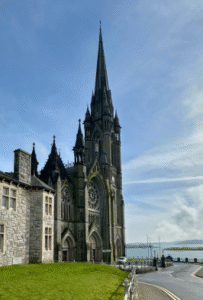
St Colman’s Cathedral, Cobh.
©Niklas Groß
Cork also boasts a vibrant and active pub scene, with events such as pub quizzes, live music – from traditional Irish tunes to international classics – beer pong tournaments, and more. Especially on weekends, there’s always something happening.
When the weather is good, relaxing outdoors is easy. In addition to Fitzgerald Park, Cork Lough and St. Patrick’s Hill are great spots to lie on the grass and enjoy the sunshine.
For short trips just outside of Cork, the harbour towns of Kinsale (about 1 hour by bus) and Cobh (25 minutes by train) are highly recommended. Both offer beautiful coastal views and a pleasant atmosphere for day trips.
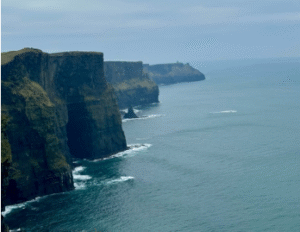
The stunning Cliffs of Moher on Ireland’s west coast.
©Niklas Groß
There’s also a WhatsApp group and Instagram page (corkinternationalstudents) specifically for international students. These platforms help organize a variety of events in the city, such as parties, pub crawls, karaoke nights, and more. They also arrange affordable tours to Irish landmarks like the Cliffs of Moher, cities such as Dublin or Galway, and scenic hikes to places like the Ring of Kerry or Coumshingaun Lough. The people involved are very welcoming, and it’s a great way to make new friends – including students from UCC.
Another cultural highlight is attending a match at the GAA stadium to cheer for Cork in traditional Irish sports like Hurling and Gaelic Football. When Cork reached the provincial finals and even the All-Ireland semi-final and final in Hurling, the whole city came alive with celebration and watch parties.
If you’re a fan of other sports, you can also catch international football matches at pubs like The Woolshed, which even streams the German Bundesliga – perfect if you want to see Borussia Dortmund win a match!
5. Conclusion
I truly enjoyed my time in Ireland. I had the chance to meet many friendly and inspiring people and gained valuable professional experience. Following my internship, I’ll be moving back to Cork to work full-time for the same company. This internship was an incredibly rewarding experience both personally and professionally.
My Research Stay at UC Berkeley
- PhD Candidate for Electrical Engineering
- USA, Berkeley
- University of California, Berkeley
- 05/2025-08/2025
- Preparation and organization of the stay:
I am currently in my final year of my PhD at the Center for Ageing, Reliability and Lifetime Prediction for Power Electronics and Electrochemical Systems (CARL), RWTH Aachen, where I work on analyzing the aging mechanisms of batteries using experimental and simulation-based data. Battery research is highly interdisciplinary, combining knowledge of electrochemical processes, experimental setups, engineering, and data analysis. Spending part of my research abroad had always been very important to me, as it offered the chance to gain new perspectives and access complementing expertise for my research. The energy, controls, and applications lab (eCAL) at UC Berkeley, with its expertise in algorithms, lifetime analysis, and data-driven methods, complemented my background and offered the expertise I needed for my analyses. To prepare for my time there, I organized the battery aging measurements I had started at RWTH Aachen so that they could be analyzed once I arrived at the lab. A professor at my institute from RWTH Aachen put me in contact with my host supervisor.
Organizing the logistics of a research stay in the US can be challenging. Finding accommodation in Berkeley on short notice was not easy, so I opted for an Airbnb, while shared apartments or nearby cities like Oakland offered more affordable alternatives.
- First steps after arrival in host country:
By chance, my first day at UC Berkeley coincided with the annual eCAL retreat, where we went lawn bowling and had dinner afterward. It turned out to be the perfect way to meet the whole group in a relaxed setting and to get to know the PhD students right away. Everyone was very welcoming, and a few of them gave me a tour of the lab. I also met my host professor in person that day, which made it easy to settle in and feel like I could start my research stay right away.
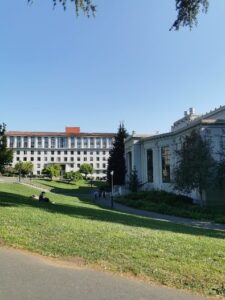
Campus of UC Berkeley
©Katharina Quade
- Academic experience:
eCAL had the feel of a close-knit group: about ten PhD students worked under the supervision of my host professor, supported by a handful of bachelor’s and master’s students. The culture and PhD process at UC Berkeley was noticeably different from what I was used to in Germany. At RWTH Aachen, PhD students often supervise theses and work closely with student assistants, whereas in Berkeley the emphasis was much more on individual projects and dissertation work without relying on large infrastructure and equipment. This meant fewer administrative and organizational duties for the PhD students at UC Berkeley, allowing researchers to focus deeply on their own topics. Each environment had its own strengths and weaknesses, and this exchange gave me the opportunity to integrate the strengths of the US PhD system into my work at RWTH Aachen.
The lab’s relatively small size made it easy to settle in and even though the students were spread across different campus buildings, communication was open and effortless. eCAL was also highly international, with students from a wide variety of cultural backgrounds. This diversity enriched our exchanges, blending technical discussions with cultural perspectives and insights into PhD programs.
- Financing:
The cost of living in the US, especially in the Bay Area, is quite high, covering groceries, leisure activities, and daily expenses. Fortunately, I lived close to a Trader Joe’s, which offered relatively affordable groceries. Getting to San Francisco on the weekends was very convenient thanks to the BART train, while within the city, buses and the metro were the main public transport options. For trips outside the Bay Area, having a car is essential. Renting a car in the US is comparatively affordable, but it requires a credit card.
-

The Golden Gate Bridge on a sunny day. San Francisco is just about 30 minutes away from Berkeley by train.
©Katharina QuadeLeisure:
Berkeley itself is a relatively small city in the East Bay, and since my stay took place during the summer semester, both the campus and the city were fairly quiet. Overall, I really enjoyed Berkeley and San Francisco as the area has a lot to offer, both culturally and culinarily. I visited Alcatraz, explored several exhibitions, and had excellent food in Chinatown and Little Italy. One thing to keep in mind, though, is the microclimates in the bay area: it can quickly turn cold, windy, or foggy.
California’s landscapes are incredibly diverse, and it is the US state with the most national parks. Many of them are accessible from the bay area, though usually a car is necessary. During my stay, I was able to visit Yosemite, Sequoia, Redwood, and Death Valley National Parks, each was impressive in its own way. I was particularly fascinated by how different the scenery can be within a single state: from the forests of Redwoods and Sequoias to the dry, hot desert landscapes of Death Valley.
- What added value did the stay have for my career prospects?
My research stay abroad was an important step for my professional development. It allowed me to work in an international research environment and gain insights into different academic cultures and PhD systems. I strengthened my expertise in advanced battery data analysis and honed my ability to work in interdisciplinary, multicultural teams. Global issues like climate change can only be addressed collectively, and this experience highlighted how much progress depends on collaboration across borders and disciplines.
- To what extent does my stay abroad have a sustainable character?
My stay abroad had a lasting impact in several ways. Beyond my own research, I built professional connections with professors, startups, and companies at UC Berkeley, creating opportunities for future collaboration. Networking is crucial in academia, and I am confident these contacts will remain valuable. I am still in touch with several PhD students and look forward to meeting them again in the future.
- Conclusion:
My time in California was definitely both professionally and personally rewarding. Engaging with students from diverse countries brought new perspectives to my work and daily life. Most importantly, the stay allowed me to focus and collaborate intensively on my research, which was crucial for successfully completing my PhD and ultimately deepened my passion for science and research.
My Internship at Axelera AI in Leuven
- Electrical Engineering, Information Technology and Computer Engineering M.Sc.
- Belgium, Leuven
- Axelera AI N.V.
- 11/2024 – 04/2025
1 Application
I discovered the internship posting on LinkedIn and applied via the official Axelera careers page in late July 2024. A few days later, I had a first screening call with the hiring manager who would be supervising my internship. Next there were two longer technical interviews to assess my abilities in software and hardware development. Finally, an executive interview with the team manager and an HR interview about cultural fit and compensation, respectively, concluded the process by late August. As soon as I had received the signed work contract, I applied for Erasmus internship support from RWTH, which required some more forms and signatures.
2 Accommodation
Leuven is a student town, owing to the presence of KU Leuven. This is Belgium’s largest university by number of enrolled students. For this reason, both studios and shared flats are widespread throughout the city, but nevertheless highly sought after.
A surprising number of accommodations is advertised and rented through Facebook, which was also how I eventually found the place I stayed at. It was a room in a shared house, within walking distance of the train station and my workplace. Like most rental contracts, mine had a fixed duration of one year, with a fee for early termination that I had to pay since I left earlier. The room also came furnished, so I could move to Leuven comfortably by train from Aachen, bringing just clothing, my bike and other personal items.
3 Costs
The rent was €520 with all amenities included, which was a fairly average market rate based on my impression. Overall, housing seemed to be slightly more expensive than in Aachen, especially for studio apartments where rent could reach €1000+.
In general, most items and services seemed to cost approximately 20% more than one might be used to from Germany. This becomes apparent at restaurants, but also for groceries and other everyday purchases.
One notable exception to the higher prices is train travel. A youth ticket for any route inside Belgium with any SNCB train costs about €8 regardless of time or distance, and can become even cheaper if bought in bulk or when traveling during the weekend. Furthermore, Belgian trains are very rarely delayed.
4 Work
The project I would complete during my internship was already outlined in the job description. Its main goal was to develop a compressor block in hardware that would reduce the amount of intermediate data to be transferred inside the Axelera AI processing unit during inference. Ultimately, this would enable higher energy efficiency and performance at the cost of slightly increased chip area and complexity.
My project was structured in the phases of algorithm research in the scientific literature, prototyping of promising algorithms in Python, and finally implementation of one or more algorithms in Verilog for integration within the DMA unit.
Even though Axelera generally allows remote work, the internship contract required 100% time in the office. This facilitated deeper connection and better knowledge exchange with my colleagues, and was easily doable for me with a 10-minute walking commute.
While several employees in the System Architecture team were located in Leuven, my direct manager was based in Zurich. To enable better collaboration, we strived to meet physically once per month. Sometimes, she came to Leuven, but I also traveled to Zurich on several occasions for one week at a time. All travel expenses were covered by Axelera.
5 Everyday Life
Leuven is located in Flanders, the Dutch-speaking part of Belgium. To blend in better with everyday life, I decided to learn Dutch and reached B1 level. Reading and writing is relatively easy as German native speaker, while speaking and listening may be slightly more difficult. I attended courses at CLT, a language school affiliated with KU Leuven. These courses took place twice a week in the evening, and the classroom was easily reachable on foot. On other days, I went to a nearby gym and joined the local running club.
Supermarkets close earlier in Leuven compared to Germany, which meant that I mostly had to do groceries on Saturdays. This also applied to other time-intensive activities, such as travel.
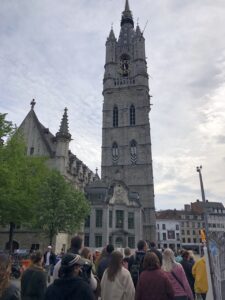
Belfry in Ghent
©Thorben Fetz
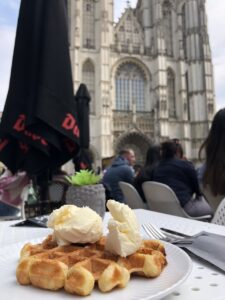
Liège Waffle
©Thorben Fetz
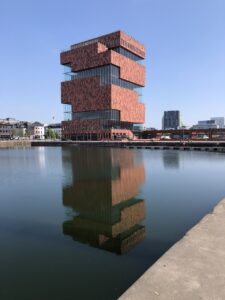
MAS in Antwerp
©Thorben Fetz
Taking advantage of the aforementioned very affordable train tickets, I visited most larger Belgian cities during weekends. Brussels is just 20 minutes away, but also Li`ege, Mechelen, Antwerp, Ghent or Bruges can be reached with direct connections. Even going to the seaside in Ostend takes less than 2 hours.

Train World
©Thorben Fetz
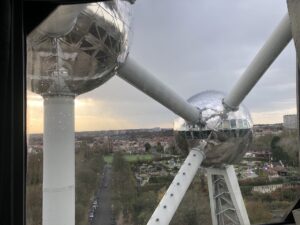
Inside the Atomium
©Thorben Fetz
Some other attractions I visited include TrainWorld in Schaerbeek and the Atomium in Brussels. Many museums offer discounted entry for students.
6 Conclusion
Overall, I am very grateful for the opportunity of conducting my internship at Axelera AI in Leuven. The experience has been invaluable, allowing me to develop both technical skills in algorithm and hardware design, as well as soft skills through international collaboration. Living in Belgium broadened my cultural horizons, while learning Dutch facilitated daily interactions.
The Erasmus funding was welcome in making this experience possible, covering relocation costs and a portion of the living expenses. This support allowed me to focus fully on my professional development and cultural immersion.
My Internship in Athens
- Engineering Geohazards M.Sc.
- Greece, Athens
- Agricultural University of Athens
- 03/2025 – 06/2025
When I first decided, that I wanted to spend some months during my studies in Greece, I was very overwhelmed with the organisation. Luckily, throughout my academic career I was able to already make some contacts to academic staff at Agricultural University in Athens. These people were very willing to host me as an intern in their department for a few months. Hence, I was lucky in finding an internship place relatively fast.
The next challenge then was to find accommodation. I did not know what I was looking for really. I only knew that I definitely did not want to live on my own but in a shared flat, to be able to make new contacts and friends quickly. Most online resources and friends of mine who had already lived in Greece longerterm, suggested to check Facebook groups to find listings of rooms in shared apartments. Whilst this was a good suggestion and I also contacted some of the listings, I kept being fearful of scams. I had heard a lot about scamming in Greece (which to this day, I have never experienced myself. Probably, this is only a bad stereotype of the Greek). This is why I then opted for renting a room through the platform ‘Housinganywhere’. I was very lucky in finding a room in a shared apartment in a very central location (Exarchia). When I moved in, I was very excited to meet my flatmates because I had no idea who I would be living with for the next three months. However, I was very lucky to be sharing the apartment with a 25 year old German and a 23 year old Romanian. We quickly became friends and explored our new home together.
I had previously been to Greece either for vacation or for work trips several times and always perceived the living expenses to be incredibly low. However, I must withdraw this statement. Now, that I have spent so much time in Athens, I must say that living expenses are nearly equal to those in Germany (Aachen). Whilst some produce like fresh fruit and vegetables or public transport were shockingly cheap, other expenses like rent, groceries, toiletries etc. were just as expensive as they are in Germany. Obviously, Athens as a large town and the capital of Greece, is rather expensive in comparison to other Greek cities. However, this left me wondering, how the typical Greek person can manage to live in Athens with the normal Greek salary.
My everyday-life in Athens was mostly dominated by the 40 hours per week that I spent inside the university working. Whilst I got to know many other Erasmus students and other Internationals, I was mostly surrounded by Greek people at work. I felt this to be a very enriching experience since I was able to learn a lot about the Greek mentality, lifestyle and mindset only through my working hours. Outside my work, I spent most of my time with other international student and/or my flatmates. Together, we tried to navigate life in Athens without getting lost in this busy city. In our free time, we naturally spent most of our time outside, in parks or on the beach. Living so close to the sea and being able to spontaneously decide to go swim in the ocean felt like a huge privilege to me.
Additionally, I tried to explore as much of Greece outside of Athens as I could. Through a thousand different options of transportation – busses, trains, trams, metros, rental cars, … – I was able to explore many remote areas as well as urban areas within Greece. These included Kalamata, Gerolimenas, Methoni, Glyfada, Korinth, Koroni and many more. In addition to that, I also really fell in love with the ancient history of Greece and spent time visiting archaeological sites like the Akrokorinth or the Delphi oracle and also the monasteries of Meteora.
If I could, I would advise everyone who thinks about spending time abroad, to consider choosing Greece. Whilst the language might seem difficult and the life in Greece seems to be busy and chaotic, it is also an incredibly beautiful country full of lovely people, delicious food, rich history, beautiful landscapes – and of course many cute cats. I have felt very welcome wherever I went in Greece, with numerous Greeks being able to even speak some German to me. The Greek people were always happy to include me in their culture and life, introduce me to their local food and traditions and make me feel at home.
My Internship at a Geotourism Company on the Island of Ischia
- Applied Geography B.Sc.
- Italy, Ischia
- Eurogeopark
- 04/2025 – 06/2025
Application / Search for an Internship
In February, I was faced with the task of finding an internship for my bachelor’s degree. I wanted to do something exciting and varied – preferably nothing that took place solely in an office. So I searched the internet and came across an advertisement for a ‘GEO internship on the island of Ischia’ from the company Eurogeopark. My interest was immediately piqued: a green island in the Mediterranean, just off the coast of Naples, geological hiking tours on volcanic, geological and botanical topics – and all of this for three months in Italy. I was immediately convinced. I applied directly via the email address provided with the required documents and received confirmation of the internship starting on 1 April on the same day. However, before I could get started, I had a few things to organize: the university had to recognize the internship abroad, I applied to Erasmus+ for financial support, looked for accommodation and planned my journey.
In the end, I decided to travel by train. A few days before I was due to start, I packed my things and travelled via Zurich – with an overnight stay – to Naples, from where I took the ferry to my destination island: Ischia.
Accommodation & Living Expenses

Ischia ©Gefion Bardenz
Eurogeopark did not provide me with accommodation, so I initially looked for a flat myself – which proved difficult. Three months is too long for holiday flats, but too short for regular rental contracts. Finally, I turned to my boss, who put me in touch with someone locally. I found a great flat in Ischia Porto, only about a 20-minute walk from the harbor and center of the city.
The flat was large – almost too large for one person – but it was perfect for entertaining guests. It had two bedrooms, a bathroom, a dining/living room, a kitchen, a balcony and was equipped with everything I needed: stove, oven, pots, dishes, washing machine, WiFi, etc. I paid €17 per day, which was quite cheap compared to the offers on the internet. At the end of my stay, I had to pay about €70 for utilities (gas, electricity, etc.).
The location was very convenient: two supermarkets were about ten minutes away, and mini markets for fruit, vegetables and everyday items were also nearby. I received €235 per month from my internship provider as salary and for the bus ticket. I would definitely recommend the monthly ticket (€33.90) – the bus system is well developed and takes you almost everywhere on the island. Alternatively, you can rent a scooter or an (e-)bike, but you should bear in mind the chaotic traffic and narrow streets.
Everyday life/Internship

Monte Epomeo ©Gefion Bardenz
Eurogeopark offers geological and botanical tours in the form of hikes and minibus tours on Ischia. The focus is less on cultural content and more on scientific topics such as volcanism and geology. There were a total of five full-day tours, two short tours and three minibus tours, which were offered daily or weekly. The aim of the internship was for us – three interns – to be able to lead the tours independently. At the beginning, we therefore walked each tour twice together with the employed geologist Yvonne in order to familiarize ourselves with the content, routes and procedures. After that, the three of us led our first tours to gain confidence. We had access to a comprehensive internal file with background information on each tour. From about the third week onwards, a fixed three-week rhythm of home office, short tours and day tours established itself. The tours usually started at 10:00 a.m., and we were supposed to be at the meeting point at around 9:30 a.m. Depending on the tour, the day ended around 3:00 or 4:00 p.m. Afterwards, I took care of organisational tasks from home.
Saturdays were work days – but without guided tours. Instead, we distributed brochures in hotels, restaurants and bars to draw attention to the offer.
Working from home, we took care of social media channels (e.g. Instagram, Facebook, GetYourGuide, TripAdvisor), created posts about events, planned posts and promoted the channels. I also wrote hotel descriptions for tourists. If we didn’t finish everything on Saturday, we distributed more brochures during the week. Depending on what was needed, we also helped maintain the hiking trails – for example, by clearing overgrown paths.
At the end, each of us was given our own topic for a blog post. My topic was mapping the vegetation along the trail, which I did while working from home. This allowed me to significantly expand my botanical knowledge.
Language
It was not necessary to speak Italian for the internship, as the guided tours and internal communication within the company were conducted in German. Even when it came to organizational matters, such as in hotels or with transfer drivers, I usually got by fine with German or English. Nevertheless, it was nice to use simple Italian phrases from time to time in everyday life – especially when making small purchases or in cafés.
Support & Contact Persons
I did not need to seek direct support from Erasmus+ or the university during the internship, as everything worked well in terms of organization. I was also lucky with my accommodation: if there were any minor problems, I could always contact my landlady. She was very friendly and helpful, which made it much easier for me to settle in and get through everyday life on the island.
Free Time/Tips

Castello Aragonese ©Gefion Bardenz
In Italy, a 6-day working week is still common, so I had Sundays off. I usually spent this day with the other two interns exploring the island or the surrounding area. We already knew some a lot places from the guided tours, but on our days off we discovered things like thermal baths with natural thermal water or visited sights such as the Castello Aragonese. A day trip to the neighbouring island of Procida is highly recommended – there you will find classic Italian idyll with colourful houses and narrow streets. For those interested in geology, trips to Pozzuoli (Solfatara) or Vesuvius are worthwhile. Sometimes, however, I simply stayed on Ischia, relaxed on the beach with a book, went swimming or strolled through the narrow streets. A personal highlight was Pelara Bay: secluded, surrounded by volcanic nature and with fantastically clear water – perfect for unwinding.
As I had no direct contact with the university or other student groups, I didn’t meet many new people. I spent most of my time with the two other interns and friends who visited me. The atmosphere at the company was more businesslike than friendly, so I didn’t develop any close relationships outside of work. There were many festivals during my stay. The traditional Easter festival with the ‘angel run’ on Easter Sunday and the colourful broom festival were particularly enjoyable. These events offered a great opportunity to get to know the local culture better.
Conclusion

Pelara Bucht ©Gefion Bardenz
The internship on Ischia was a formative experience abroad that taught me a lot, both professionally and personally. I was able to take on responsibility in many areas, independently led tours, prepared content and learned to react flexibly to new situations. I particularly enjoyed working with the guests. Living abroad also worked out very well for me: I quickly found my feet on Ischia, felt safe and comfortable, and really enjoyed island life with its nature, culture and cuisine. Although I gained valuable insights during my time at Eurogeopark, there were certain structural and interpersonal aspects that raised concerns and somewhat affected my overall impression of the organization. A lot of challenges made it difficult to fully view the company as a reliable internship provider. However, this does not detract from the overall enriching experience of having lived and worked abroad – an opportunity I would definitely seize again.


